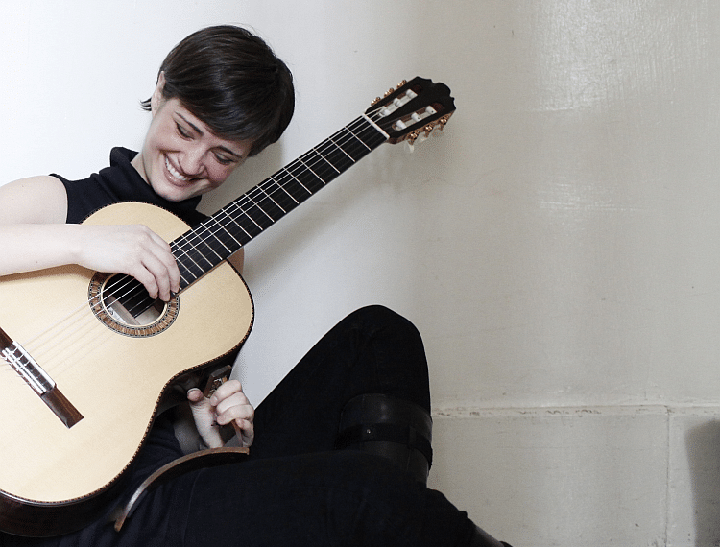The Art of Solo – Zsófia Boros 'El ultimo aliento' (HU) / Andreas Waelti 'Lowdown' (CH)
We start the live stream approx. 1/2 hour before the concert begins (real time, no longer available after the end of the concert). By clicking on "Go to livestream" a window will open where you can watch the concert free of charge and without any registration. However, we kindly ask you to support this project via "Pay as you wish". Thank you & welcome to the real & virtual club!
Andreas Waelti
It used to be easier to be a double bassist. Back in the day, a jazz bassist’s primary responsibility was the pulse, the "thump" that drove the band. Beyond that, a nodding acquaintance with melody and harmony sufficed; anything more was icing on the cake. The bow . . . well, let’s just say it was rarely used.
A classical bassist, on the other hand, mostly needed a cultivated tone and good intonation – oddly for an instrument of such mighty dimensions, power and drive weren’t really big issues. And just as jazz bassists were rarely called upon to apply the bow, the pizzicato work of classicists was usually (ahem) cultured and delicate. Not something that made you sit up and take notice.
However, by the mid-twentieth century, the bassist’s job was overflowing in all directions. Suddenly, they were expected to be equal melodic partners or to take on the role of a harmony instrument, while still holding down their traditional jobs. Outlandish techniques like flageolet, col legno, and all manner of percussive effects – basically, anything that didn't actually harm the instrument – became required skills for the progressive bassist (thanks a lot, Mingus). These days, particularly in a city as saturated in classical music as Vienna, a double bassist needs to master basically everything that has ever been required of a double bass.
Which brings us to Andreas Waelti, an old-school bassist in the best sense: he drives the music without harassing it; his playing is expressive but never overbearing. His tone is rich and singing, reminiscent of great accompanists like Jimmy Garrison and Charlie Haden, but he can also get around the instrument with surprising grace and precision. After a brief stint in Berlin, the Swiss native has been quietly anchoring the Vienna scene for over a decade now; his work with complex stylists like Georg Vogel confidently bridges the gap between tradition and modernity and his work with his own band, Transit Room, is testament to his skills as a composer.
When the Great Hiatus silenced the music scene in early 2020, things that had always been self-evident – like playing with others, or for an audience – were suddenly absent. Waelti took it in stride, turning to solo performance as a means of staying in shape. Over time, he completed and refined existing pieces, experimented with forms, and has now brought forth that rarest of birds: an album of solo music for double bass.
In order for music to be effective, it’s helpful if the listener can forget that a physical effort is involved in its creation: the instrument should be a conduit for the music's conception, not a barrier to it. The double bass can be unwieldy, but the music on Lowdown breezes past its peculiarities, delivering a thoroughly engaging program that is varied without losing coherence. “Shruti” and “Partial” are meditations on timbre, developing in layers rather than in the classic, linear sense; with the jazz classics “Milestones” and “Kind Folk”, Waelti pays tribute to the tradition that so clearly informs his playing. But he is at his best playing his own work: highlights include “Symmetric”, its bluesy introduction giving way to a highly focused set of variations on a simple figure, and “Squagganeek”, with shifting meters suspended over a rock- solid pulse.
Creating an album of solo music is a thorny venture. Besides the self-confidence required to even consider such a thing, an artist must be unflinchingly honest with themselves, purging everything unworthy or unnecessary from the music without losing the fundamental joy in music-making that made them want to do it in the first place. It’s a tightrope act between optimism and despair, a fiery forge of the spirit . . . and it is out of this forge that Andreas Waelti now comes, bearing the small gem that is Lowdown.
Zsófia Boros
The second album from the Hungarian-born Vienna-based guitarist finds her embracing a broad scope of music, broader even than on her outstanding debut En otra parte. This time the range extends from contemporary composition to jazz etude via music from Brazil, Argentina, Italy and Azerbaijan – all embraced with imagination and creative flair. Pieces played here by Zsófia Boros include Egberto Gismonti’s challenging “Celebração de Núpcias” (made famous on Dança das cabeças), Franghiz Ali-Zadeh’s “Fantasie”, Al Di Meola’s “Vertigo Shadow”, and Carlo Domeniconi’s Turkish-influenced “Koyunbaba”. These Local Objects are rendered universal by Boros’s subtle and sensitive playing in an album recorded at Lugano’s Auditorio Stelio Molo in November 2015 and produced by Manfred Eicher. (Pressetext)
https://zsofia-boros.com/
http://www.andreaswaelti.com

